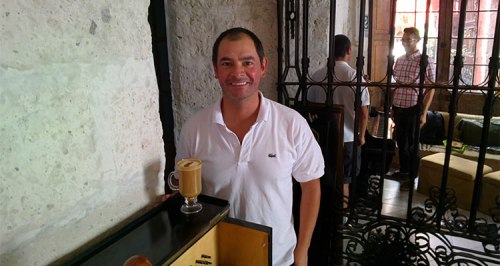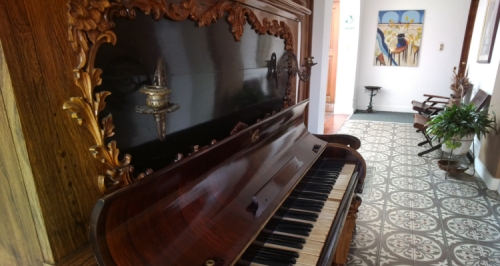For the month of March I’ve been living in and exploring a hotel directly across the street from the Centro Cultural. Staying here at la Casa de Melgar has not only made it easier to prepare for the concert and keep up with my work at the CC, it’s turned out to be an adventure all of its own.
Some hotels here are absolutely magical. The rooms and hallways are dotted with antique artifacts, desks, grand wardrobes, and ornate ceramic tiles. Garden spaces feature sillar walls of deep blue and ochre, draped with a vibrant array of hanging flowers. Among all this, neglected but charming pianos await discovery, and new friends with rare stories come out of the woodwork. I will show you the magic of these places. I will tell you of a fascinating cafe owner who was manufacturing bombs but discovered a latent urge to instead manufacture hand-made pasta. I also mixed with a far-flung group of archaeologists who experience the quiet joy of handling the objects that the ground has kept for us to discover—and which add to the story of who we are.

Arrowheads
This group of archaeologists convene at this hotel in Arequipa every year, coming from disparate parts of the world, including places like Canada, Germany, or Philadelphia. Each member of the group is a valued part of the team because they connect with the past in unique ways: there’s an evolutionary anthropologist, a plant specialist, an animal specialist, and a handler of cultural artifacts.
I spoke at length with Kurt. He works at Northern Illinois University and specializes in man-made objects. We got along well. He was friendly and I identified with his unique but joyful way of being in the world. I was particularly delighted by the fact that he doesn’t have a phone. He is very focused on his work, but not to the exclusion of sharing it. His wife is an artist, and they plan to eventually start a farm back in the Illinois countryside—along with their pet Australian Shepherd.

Toward the end of his stay, Kurt was studying a giant collection of arrowheads, weighing and cataloguing them with specific notations. As I chatted with him he let me hold one for a while, and we talked about the special feeling you get when you handle artifacts. We are lucky to have these objects. They were once held and used by humans who lived so high in the mountains that they were thought to be impossible people. These blades, unused for centuries, have been protected by the earth for us to uncover and hold. This one sat still in the ground for so long, but in that stillness it travelled swiftly through time in a direct path to our hands. It now pulsed in mine, full and heavy with stories of times past.
Will the stories that emerge from this place be accessible to the archaeologists of the future?
I started to think about the objects in use at the hotel right now, and the people who touch them every day. Will the stories that emerge from this place be accessible to the archaeologists of the future? Will they only have a vague image of what our lives were like? There is a tiny but beautiful desk that looms large in my room. Already it speaks stories. A friend of mine commented that he could imagine that a writer had written something great there. It brings me joy to have it and use it. I hang my hat just so on it. I decorate it with lovely flowers. It is a bit of a shrine to life and love. It is medicine for my mind.

Coffee, A Piano, and A New Friend
In Peru I find pianos that remind me of these archeological artifacts. They are beautiful and seem to hold rich stories. They go unused. There is hardly anyone to tune them. But people protect them and keep them anyway. Why? Do they expect some piano tuner to magically appear one day and bring them back to life?
A new cafe opened next to the hotel in the past month. It’s a great little place called Il Fornellino, with delicious pasta, fresh pastries, and tasty cappuccinos. It is a place for good people to gather. What first drew me in first was the piano. The instrument is old, and it’s in pretty bad shape, so I figured it would be good for me to investigate. I came in to inquire, and that’s when I met the owner, Lucho.


Lucho has some family in Italy, and he went to live there for a few years. His work there was in the manufacture of explosive weaponry, but he finally decided to come back to Peru to open this cafe. We’ve really had a chance to bond over the past few weeks. I liked how his life had shifted from making weapons to making people’s tummys happy.
In this cafe he wants people to be able to sit and really talk to one another. Instead of seeing this solely as a commercial undertaking, he wants to keep it personal and warm, and let the ambience attract his business.
Pianos are their own breed of artifacts.
He agreed to let me work on the piano, and I found that it has an old style birdcage action, which is difficult to handle. Still, I repaired a couple non-functional keys and started in on the tuning. As an offering, Lucho brought me one of his fantastic cappuccinos (which earned a lot of likes on Facebook). I was startled by the amount of joy that one lovingly prepared cup of coffee can evoke.

Lucho has been so friendly and supportive! When I was preparing for my concert, he enthusiastically distributed fliers to his customers and helped spread the word. He had to work during the performance, but he still snuck over to watch for a little bit. I really appreciated that.
Through much of my time at the cafe with Lucho, the piano sits quietly in the corner. I wonder if it eagerly awaits my return to finish caring for it. I’m going to need more time to try to tame that piano, and I’m not completely sure if I’ll be able to bring it up to par. I hope I can, though, as I’d like to play a little concert at the cafe before I leave. It would be a nice way to say goodbye to Lucho and the other new friends I’ve made while staying at la Casa de Melgar. It would be nice to make one more memory for the piano to hold.
How Much Is An Artifact Worth?
Pianos are their own breed of artifacts. Many of the ones I’ve encountered here have not been tuned or used in a very long time, sitting quietly in corners and shadows. It is indeed almost as if they’re waiting for me to discover them beneath layers of dust and time.

Still, even in a state of silence, they have value. They’re old and worn and interesting. And because there’s so much space here, there’s no reason to get rid of them just because they’re out of tune.

At a previous hotel, I came across another piano that had clearly been refurbished on the outside, but was a complete wreck inside. If it can’t be played, why does it matter how nice it looks? Well, personally, I can’t deny that pianos are simply beautiful things to look at.

Still, vases and candles and wardrobes are nice to look at, too. Pianos, however, make us think about music. They make us think about the people who have touched the keys. They evoke stories in a way that many artifacts can’t. Just as I felt the weight of the past in that arrowhead, pianos seem to me to hold even more magic inside.
The Currency of Joy
I chose to stay at la Casa de Melgar not only because it sits across the street from el Centro Cultural. It is brimming with things that give me a sense of joy. I used to feel so detached from objects that I felt I almost didn’t need them. But I feel that I’m learning to give objects more respect than that. I once read a book titled The Life-Changing Magic of Tidying Up. It’s a book about organizing your house, but it gave me a new way to look at objects. Some people say that when you’re deciding what to keep or get rid of in your home, one should ask: “Have I used this in the past six months?” But Marie Kondo, the author of this book, instead asks that you hold it in your hands and honestly ask “Does this bring me joy?”
Whether it’s an arrowhead, a cup of coffee or a song, maybe the ultimate currency is joy.
And this is such a beautiful way to decide what to surround yourself with in life. Detach the monetary value, the way other people feel about it, the should and could. These hotels I’m visiting, in a country far from my home, are filled with objects of beauty. There are tapestries, bold colored walls and antique wardrobes. And, of course, there are pianos.

There’s something soothing and uplifting about these things, and as I walk through the gardens, I feel comfort in yellow flowers and wooden window shutters. It brings me back to a question I’ve thought about over and over again during this trip, especially as I consider how and why to create a trillion dollar company out of a small piano tuning operation based in Brooklyn, NY: how do we measure the value of things? Whether it’s an arrowhead, a cup of coffee or a song, maybe the ultimate currency is joy.
The objects I’m surrounded with here, and the people I’ve met during my stay, all have a certain value that is completely intangible, but also completely apparent. “You know it when you see it,” “You feel it.” I still want to get Lucho’s piano tuned up so it can make music again. But even if I can’t, it’s clear to me that it brings a beauty to the cafe that nothing else really could, and with that, it brings joy.
About this series: Floating piano has come to be internationally known, and thanks to the internet we’re getting inquiries worldwide about our top-rated apprenticeship program. This has inspired us to try to connect with international piano lovers in person via some transcontinental traveling. Eathan Janney, lead technician and founder of FPF will be visiting Peru to search for human connections through pianos. Meanwhile our star apprentices Daniel DiMaggio, Bimol Karmaker and Tom Erickson are manning the ship at home in NYC, ready to tune your piano to the highest standards.
As a “Goodwill” Ambassador, FPF assigns itself the task of connecting with piano owners in various locations and exploring the histories of their pianos. We will document these adventures and stories, and as a gesture of good will, offer to tune the pianos for free. Piano tuning is our business, but we are also fascinated with the non-transactional aspects of a piano tuning visit: the interaction with a piano owner, the sharing of music, the caring for an object that has a life history of its own. Music is a global phenomenon that exists outside of the physical, political, and national boundaries that may separate us. We would like to highlight these factors by making connections through pianos and sharing these stories with you.
Special thanks to playwright Chad Eschman for collaborating on this post.

You must be logged in to post a comment.